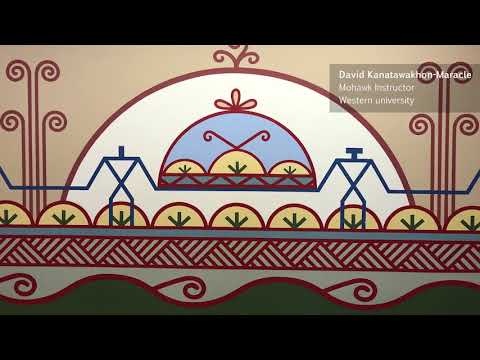In this unit, Dr. Kanatawakhon-Maracle speaks eloquently about how vital each Indigenous language is to the identity of each First Nation, and about the long-term effects of colonization by the English and the French.

A YouTube element has been excluded from this version of the text. You can view it online here: https://ecampusontario.pressbooks.pub/essentialsoflinguistics/?p=235
Video Script
Canada is a bilingual country … and I think if Canada learns to extend itself, we’ll start including more and more Aboriginal languages. I think Canada is, would be better to tout itself as a multilingual country. Because I think when doing that, even if they, if their definition of multilingualism is, is the two founding languages and then the Indigenous languages, you’re still looking at you know like fifty-five languages. And then because the difference, I think too, Native people have to be included in all that because we were here when English and French showed up. Okay, English and French showed up and they created the present-day institutions and stuff like that, okay fine. Everybody else who has come to this country basically has read the brochure and understood that English or French are the languages, therefore come to this country understanding that, okay I’m going to have to learn English or French because that’s how the company is organized, country is organized. Or if maybe I’ll go learn an Indigenous language as well. But the Indigenous languages have to be at the table.
[CA: The English and French arrived and didn’t say oh well we’re gonna have to learn the language that people speak — they said we’re here, now you’re gonna speak our language.]
Yeah, but you know initially they did learn our languages to deal with us because they didn’t have much choice. We had what they didn’t have and when we got to a point where we no longer had what they wanted, and of course, they wanted the land which meant pushing us off anyway, so the respect for the languages and stuff, kind of went out the door. Then it became well everybody here speaks English only. … I find that we need we need to have the languages. I think that gives us a greater sense of who we are — the language!
And, and the thing is that for, for Native people in this country we have spent so many years under the colonial thumb and so many years being convinced that our own languages and our traditions and everything that’s about us is inferior or not as good as … And the thing that I’ve found is that if you’re a Native person you can work your butt off to become as much like you know the non-native Canadian; at the end of the day your skin is still brown and that’s not going to change. If I focus on speaking Mohawk then in the process of learning my language I’m also learning Mohawk culture and what it is to be a Mohawk person and that’s, I think is something that is very important. We’ve gotten into the habit of being Indians or Natives or Aboriginals or Indigenous. Nowadays the word’s ‘Indigenous’. I think I keep telling my students, I said you know, I said, when I was born I was born an Indian but then I became a Native and then I became Aboriginal and then I became First Nations and now I’m Indigenous, yay! You know, Indigenous is the word of the 21st century and I’m sure they’ll find another one, but the word I would really like them to find and stick to is Mohawk, Oneida, Ojibwe, Chippewa. Know us by our nationalities, know us by our distinct cultures, know us by what makes us unique in the world.



